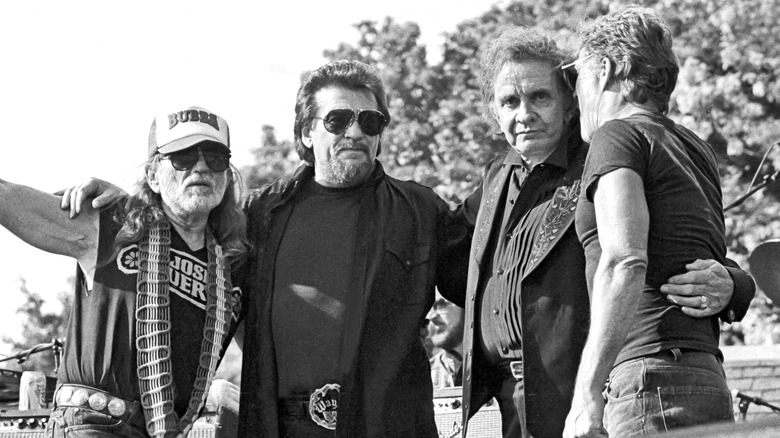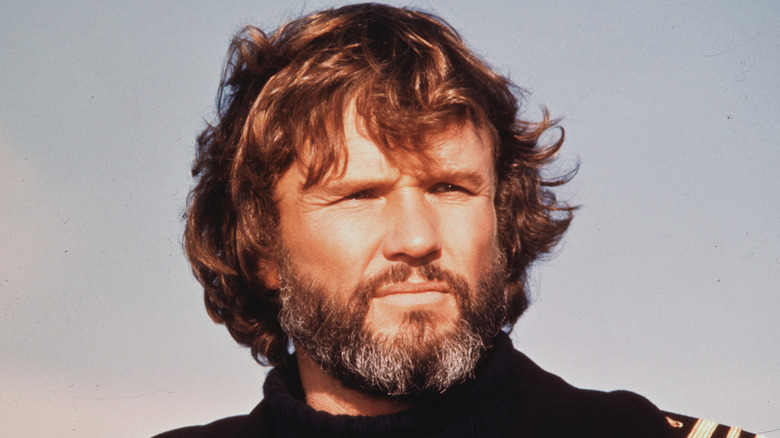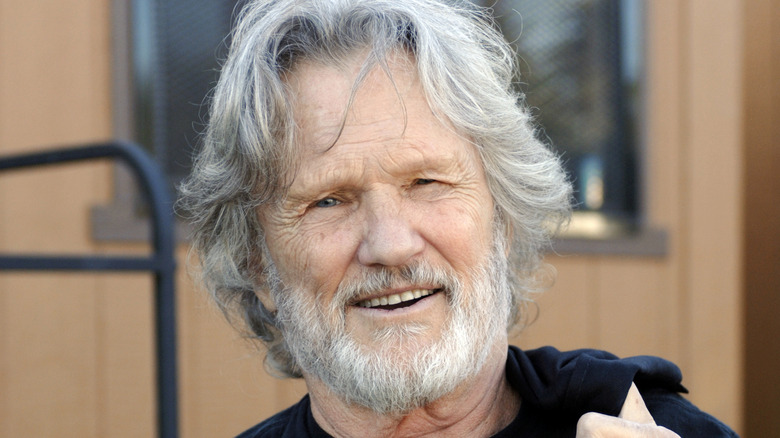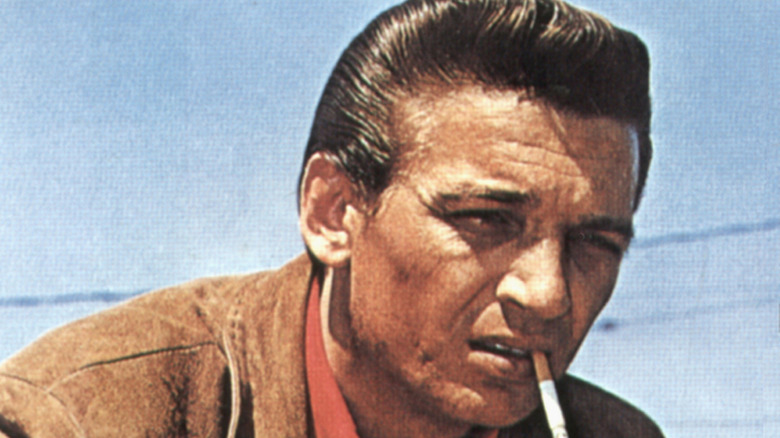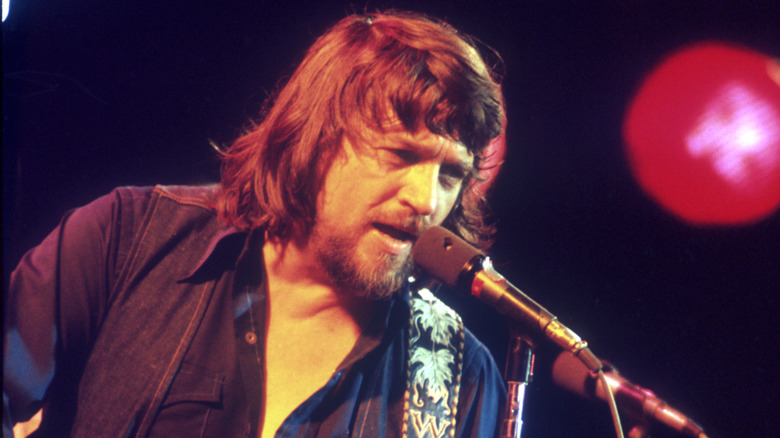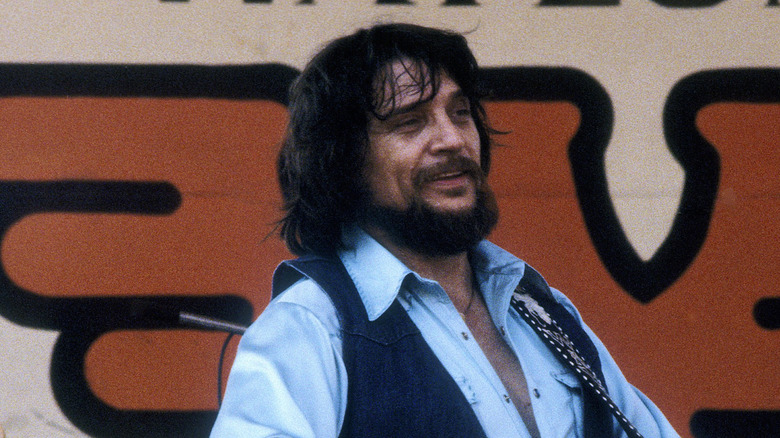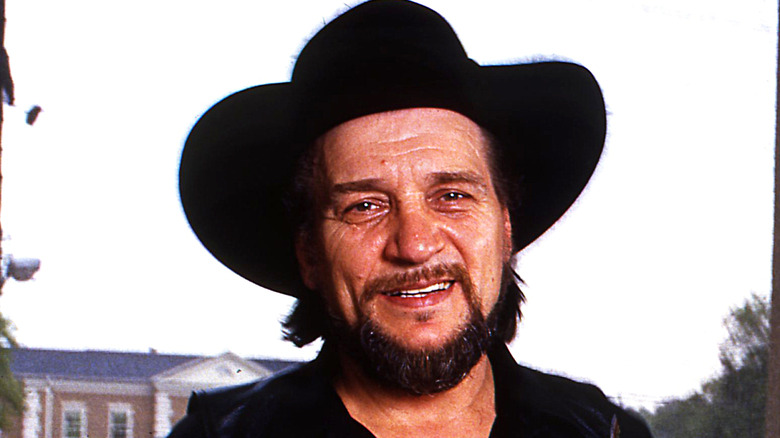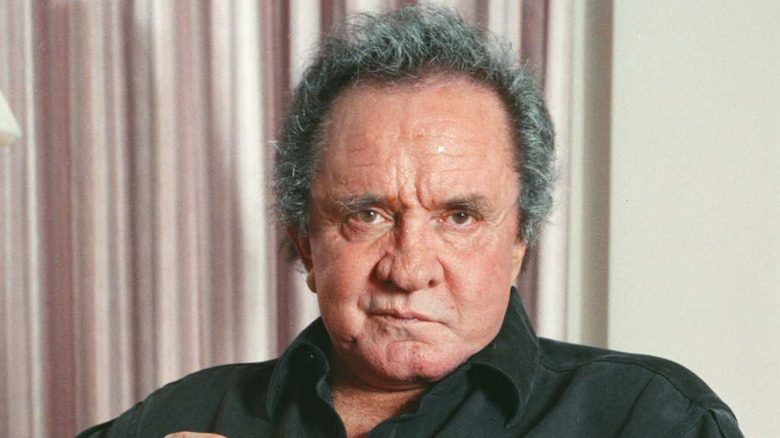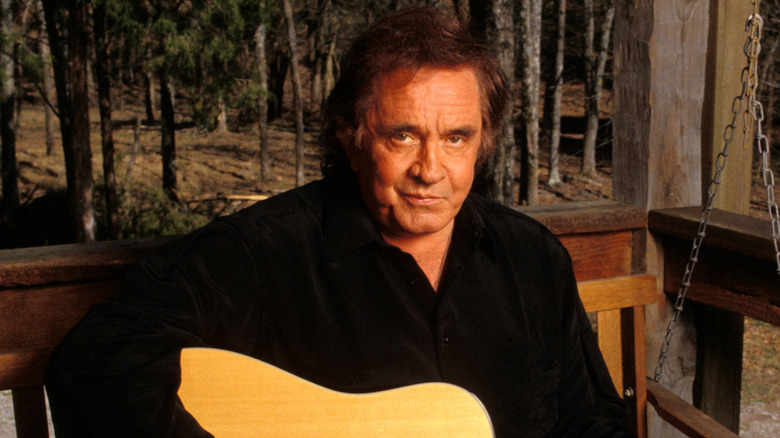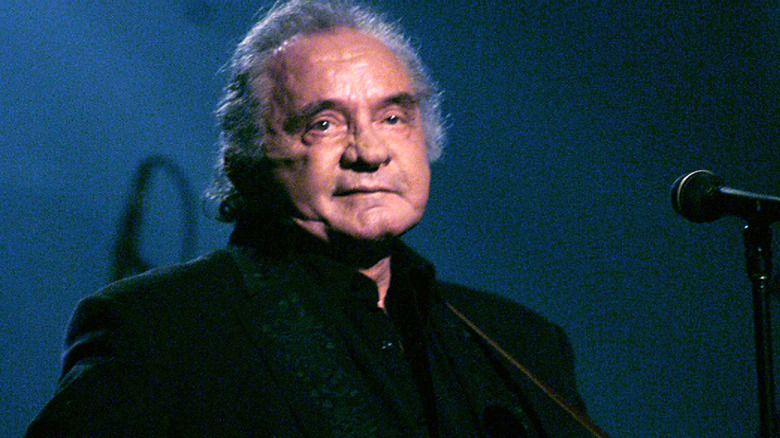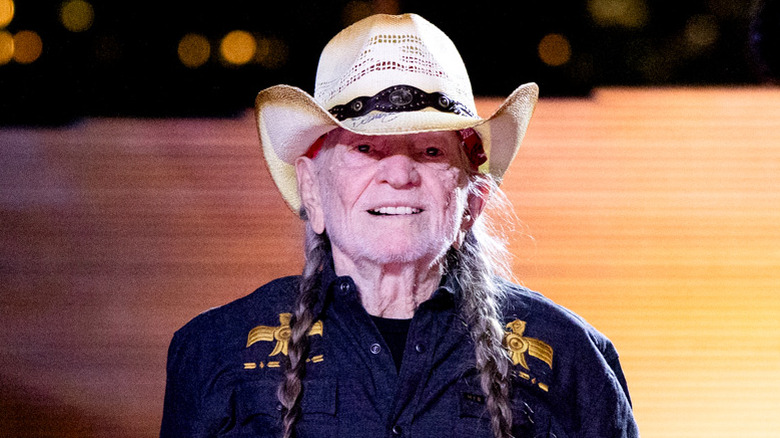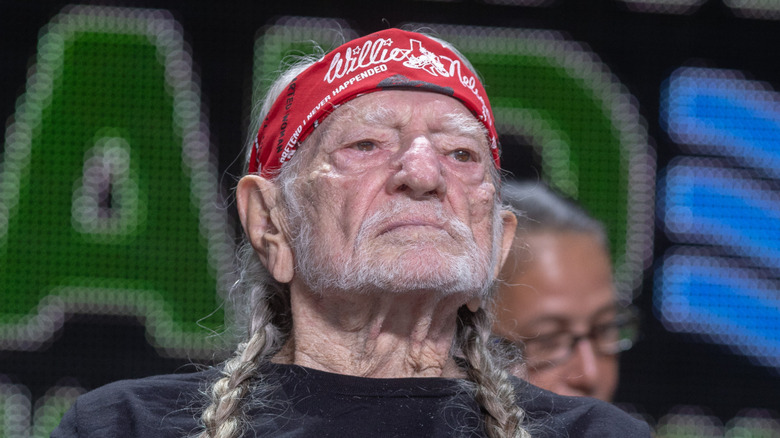The Tragedy Of The Highwaymen Band Explained
After establishing themselves with one band or a significant solo career, musicians will often try something new and get together with other luminaries to form an all-star team of artists. The best supergroups in history are almost all of the classic rock variety, with one notable exception: the Highwaymen. Four of the biggest bad boys of outlaw country, a gritty, enigmatic, and story-driven sub of the all-American art form, joined forces and combined their formidable talents to create a pop culture juggernaut. The debut LP from The Highwaymen, titled "Highwayman," was released in 1985 and sold in excess of a million copies. Four more albums followed, as did the made-for-TV movie "Stagecoach."
But it wasn't just four country musicians who could call themselves The Highwaymen — it was four absolute musical legends and national treasures. Populating the group were solo superstars Kris Kristofferson, Waylon Jennings, Johnny Cash, and Willie Nelson. Their visceral, evocative songs were so well embraced because these singers understood their often heartbreaking and startling material. Individually, each member of The Highwaymen lived a life full of danger, tragedy, and sadness. Here's a trip into the tragic offstage lives of The Highwaymen — Kristofferson, Jennings, Cash, and Nelson.
Kris Kristofferson was disowned by his family
As a young man, Kris Kristofferson was both very athletic and extremely smart. A star in rugby, football, and boxing — he was a decorated Golden Gloves amateur fighter — Kristofferson left his military family and enrolled at Pomona College in San Mateo, California. Kristofferson earned a bachelor's degree in creative writing and graduated with honors. He was also inducted into the prestigious academic club the Phi Beta Kappa Society, and in 1958, he was offered a Rhodes Scholarship. That allowed the budding writer the chance to study English literature at Merton College, one of the institutions comprising the fabled Oxford University.
Following matriculation at Oxford, Kristofferson felt forced to join the military, both by his U.S. Army major general father and the U.S. government, as he'd deferred service to attend graduate school. Kristofferson became a helicopter pilot in the Airborne Rangers, and he opted for an honorable discharge in 1965. Despite being offered a job as a professor of English literature at the exacting United States Military Academy at West Point, Kristofferson decided to carve out his own path as an artist. His parents subsequently stopped speaking to him and cut him out of the family. "God knows my mother was an a******. And my old man was gone most of the time," Kristofferson later told Rolling Stone.
Kris Kristofferson was misdiagnosed with Alzheimer's disease
When he was in his mid-70s, Kris Kristofferson started to experience memory loss and other mental health issues. At first, his doctors attributed those problems to the early effects of Alzheimer's disease, or theorized that it was the result of dementia brought on by head blows endured in the boxing, football, and rugby he'd participated in as a student. The musician's mental health declined to the point of constant forgetfulness, and he wasn't able to write songs anymore.
Several years after the deterioration began, Kristofferson found out that he'd been diagnosed with the wrong condition. He tested positive for Lyme disease, likely contracted from a tick bite Kristofferson got while shooting the 2006 movie "Disappearances" in Vermont. Getting on a regimen of Lyme disease medication, and ceasing to take the strong and damaging Alzheimer's medicines that he didn't need, helped bring back Kristofferson's mental facilities.
The tragic final years of Kris Kristofferson
While he dealt with a battery of health problems concerning his brain, Kris Kristofferson simultaneously faced issues with his heart, lungs, and bones. Just after filming "Disappearances" in 2006, a doctor diagnosed Kristofferson with severe sleep apnea, but the musician refused to use a prescribed CPAP machine to help him breathe at night. "He had painful knees and annual knee shots, a pacemaker for arrhythmias," the musician's wife, Lisa Meyers, told LymeDisease.org. All that came on the heels of a bypass surgery Kristofferson underwent in 1999.
In 2021, Kristofferson lacked the physical stamina necessary to tour, and he retired from performance and public life at the age of 84. He passed management of his affairs on to some companies and relatives, and sold his California ranch in 2023 to live in Hana, Hawaii, where his home was nearly swallowed by a wildfire. It's at that property where Kristofferson, 88 years old, died in September 2024.
Waylon Jennings almost died on 'The Day the Music Died'
In the late 1950s, Texans Waylon Jennings and Buddy Holly became fast friends and collaborators. Holly produced Jennings' first single, and in 1958 he hired the musician to play bass in his band on a tour of the Midwest. The Winter Dance Party featured The Big Bopper (J.P. Richardson) and Ritchie Valens but was headlined by Holly, who was one of the hottest acts in the country thanks to hits like "That'll Be the Day" and "Peggy Sue."
The musicians' perpetually cold tour bus repeatedly broke down, and Holly was so tired of the grind that after a show in Clear Lake, Iowa, on February 2, he chartered a small plane to get himself to the next tour stop, near Fargo, North Dakota. Richardson had the flu and Valens won a coin toss, so they got seats on the aircraft, with Jennings giving up his seat to The Big Bopper. Before Holly got on his plane and Jennings braved the bus ride, Holly quipped (per The Independent), "I hope your damned bus freezes again." Jennings' fateful retort: "I hope your ol' plane crashes." In a brutal twist, the plane did crash. Remembered in rock history as "The Day the Music Died," the tragic death of Buddy Holly came shortly after liftoff, when the plane crashed in a field. Holly, Richardson, Valens, and pilot Roger Peterson all died, and Jennings experienced survivor's guilt for many years after the accident.
Waylon Jennings contracted hepatitis and developed heart disease
In 1972, Waylon Jennings' tour took him through New Mexico and Colorado border towns. His health somewhat compromised after receiving injections of antibiotics for a dental issue, he was told by his booker to avoid eating anything in the area because of a localized hepatitis outbreak, and contracting the viral inflammatory disease could cause substantial harm to his liver. He'd forgotten the warning when he consumed a piece of pie and a glass of milk at a café, then remembered when he fell incredibly ill a few hours later. Jennings performed as scheduled but afterward couldn't move, felled by back and kidney pain with his skin bearing a yellowish glow, a common symptom of hepatitis. Then he fell asleep and awoke to a doctor diagnosing him with hepatitis, and after initially refusing hospitalization, he relented to his wife's urging and sought treatment.
Sixteen years later, Jennings once again faced a life-threatening health emergency. While on his way to a December 1988 concert in Tennessee, Jennings experienced chest pains and had his bus driver take him to a Nashville hospital. With major blockages in three arteries, Jennings consented to emergency triple bypass surgery.
Waylon Jennings faced multiple drug addictions
Between 1972 and 1984, Waylon Jennings found himself profoundly addicted to cocaine. Privately, friends and relatives were concerned that the musician could die from his drug use, while publicly it was no secret that Jennings was in the throes of overuse. A crowd of fans at a Portland concert booed him off the stage after he delivered a few songs while visibly intoxicated, and in 1977 he was arrested by federal Drug Enforcement Agency operatives at a recording studio in Nashville and charged with possession of cocaine with intent to distribute. Jennings was often so high on cocaine that he didn't feel the need to eat and subsisted entirely on vitamin-fortified milkshakes forced upon him by his wife, musician Jessi Colter. "Jessi went through hell," Jennings told People. "She was watching me die."
Despondent and guilty over his drug use and everything it had cost him, financially and intangibly, Jennings quit cocaine in 1984 with the help of a friend: fellow Highwayman Johnny Cash. After a stay in the Betty Ford Center helped Cash recover from an addiction to painkillers, he recommended rehab to Jennings. Having once tried and failed with that path, Jennings decided to just stop. After sending $20,000 worth of cocaine down a toilet, he vowed to never do the drug again, and he didn't.
Diabetes killed Waylon Jennings
Waylon Jennings' faced a lot of side effects after he quit using cocaine in the 1980s. "I would have night sweats about drugs, getting mad at myself while I slept because I usually took it in my dreams," he wrote in "Waylon: An Autobiography." And because cocaine is a powerful appetite suppressant, when Jennings ceased ingesting cocaine, the urge to eat ramped up. "I hated the way I looked, because once I started gaining weight, I couldn't stop," Jennings wrote. After about a decade of a drug-free life but persistent weight issues, Jennings was diagnosed with Type 2 diabetes. Often seen in older and heavier adults, the disease prevents the body from properly regulating blood sugar levels, and that can eventually lead to severe complications, including vision loss, bad circulation, an increased susceptibility to infection, and the loss of kidney function.
By the early 2000s, Jennings began to feel the effects of Type 2 diabetes, and he underwent surgery to alleviate tremendous pain in each of his legs brought on by peripheral vascular disease. It didn't quite fix the issue, and in 2001, Jennings received another procedure to aid circulation in his extremities. The singer had trouble walking already, and after contracting a foot infection, Jennings had to have the appendage surgically amputated. Doctors expected Jennings to recover enough to perform again in a few months, but in February 2002, the musician died at home from the long-term health effects of diabetes. He was 64.
Johnny Cash was profoundly affected by his brother's violent death
The tragic, real-life story of Johnny Cash includes the devastating death of a family member. Cash's brother, Jack, was two years older, and he had aspirations of being a Christian minister. To help his impoverished family pay the bills, 14-year-old Jack worked a job cutting wood in a school shop in Arkansas, and one day he was pulled against the blade of a table saw and brutally injured. "The table saw had cut Jack from his ribs down through his belly, all the way to his groin," the musician wrote in "Cash: The Autobiography." Following operations and a brief period in which he seemed to be on the mend, Jack Cash's case was deemed terminal, and he died in a hospital a week after the workplace accident after suffering a regurgitation of intestinal toxins.
"Losing Jack was terrible. It was awful at the time and it's still a big, cold, sad place in my heart and soul," Johnny Cash wrote.
Johnny Cash was responsible for a massive wildfire
In June 1965, Johnny Cash drove his camper to the home of his nephew Damon Fielder, and they headed out to spend some time in the wilderness of the Los Padres National Forest, an area that's home to some of California's most cherished natural treasures, including the beaches of Big Sur and the California condor. Cash was already drunk, and he drank and swallowed pills during the ride, eventually stopping at a fishing hole in a canyon. Some hours later, a fishing Fielder smelled smoke, and he saw it coming from nearby Cash's camper. The musician was on the ground, fanning the flames of a campfire that he was too intoxicated to notice was rapidly spreading. Fielder urged evacuation, but Cash refused to leave, only yielding after his nephew hit him with a tree branch. Cash sat by a creek, unwilling to flee, so Fielder ran off and found a rescue helicopter to retrieve his uncle.
Cash's carelessness could have resulted in one of the most destructive wildfires in history, but crews limited the blaze to the still-awful destruction area of about 500 acres. The singer told Forest Service investigators that sparks from his camper had started the fire, which killed 49 of the 53 condors in the area. Cash was ordered to pay a fine of $125,000, which was later knocked down to $82,000.
The horrendous health history of Johnny Cash
As of 1965, and in addition to long-standing issues with alcohol, Johnny Cash was addicted to barbiturates and amphetamines – so much so that he became so agitated during a performance at the Grand Ole Opry that he took a microphone stand and smashed up the stage lights. He was banned from the venue for three years, and he blamed his drug use for the end of his first marriage.
With those days behind him by the 1990s, Cash coped with a series of harrowing medical struggles. In 1997, after exhibiting a tremor, a slur, and balance and mobility issues, Cash announced that he'd been diagnosed with Parkinson's disease, a degenerative neurological disorder, but what he actually had was Shy-Drager syndrome, another condition that similarly degrades the nervous system and leads to a lack of muscle control. By 2000, doctors didn't think Cash had Shy-Drager syndrome either, and began treating the singer for autonomic neuropathy, characterized by a suite of issues that affect the nervous system and may cause various systems to lose function. Some of the signs of that disease had been covered up by Cash's previously diagnosed Type 2 diabetes, which led to substantial vision loss and made him more likely to contract pneumonia. A bout of that left Cash in a coma for eight days in 2001. Diabetic complications ended Cash's life in September 2003 at the age of 71.
Willie Nelson's massive tax scandal
Don't be fooled by his humble appearance, regular-guy nature, and how he still uses his childhood guitar named Trigger — Willie Nelson is a very wealthy man. He sold a lot of records in the 1970s and 1980s, including solo hits like "Whiskey River," "On the Road Again," and "Always on My Mind" and all those Highwaymen albums. Unfortunately, Nelson failed to pay the voluminous taxes on his earnings. According to Nelson, it's not that he didn't pay the taxes so much as the taxes weren't paid. He's entrusted a financial team with managing his fortune, and they'd poured most of the money into sketchy tax shelter schemes.
In 1990, representatives of the federal government descended on Nelson's homes in six states and claimed ownership of his real estate holdings, master recordings, musical gear, and ceremonial platinum records. That paid down the debt somewhat, but Nelson remained on the hook for $16.7 million, including $10.2 million in interest fees and penalties. After negotiating the amount down to $9 million, Nelson paid off the debt by February 1993. Much of the funds came from Nelson's appearance fee for a Taco Bell commercial and "The IRS Tapes: Who'll Buy My Memories," an album Nelson recorded quickly and cheaply and sold via television infomercial.
The tragic death of Willie Nelson's son
Across his four marriages, Willie Nelson fathered seven of his eight children. William, who went by Billy Nelson, was the country musician's third-oldest child overall and his eldest son. The younger Nelson experienced a difficult time in the late 1980s and early 1990s. He'd been arrested on DUI charges four times, enrolled in a rehabilitation program, and had separated from his wife and the mother of his daughter.
On Christmas Eve 1991, a friend of the younger Nelson's visited the 33-year-old at the lob cabin he called home in Davidson County, Tennessee. After the pal left at about 2 a.m., Billy Nelson died by suicide. He was found unresponsive in his home on Christmas morning. Three days later, Willie Nelson assisted in the memorial service and burial of his son in their family plot in a Vaughn, Texas, cemetery. "I've never experienced anything so devastating in my life," Nelson was overheard remarking to a friend (via People).
If you or anyone you know needs help with addiction issues or is struggling or in crisis, contact the relevant resources below:
- The Substance Abuse and Mental Health Services Administration website or contact SAMHSA's National Helpline at 1-800-662-HELP (4357).
-
Call or text 988 or chat 988lifeline.org
